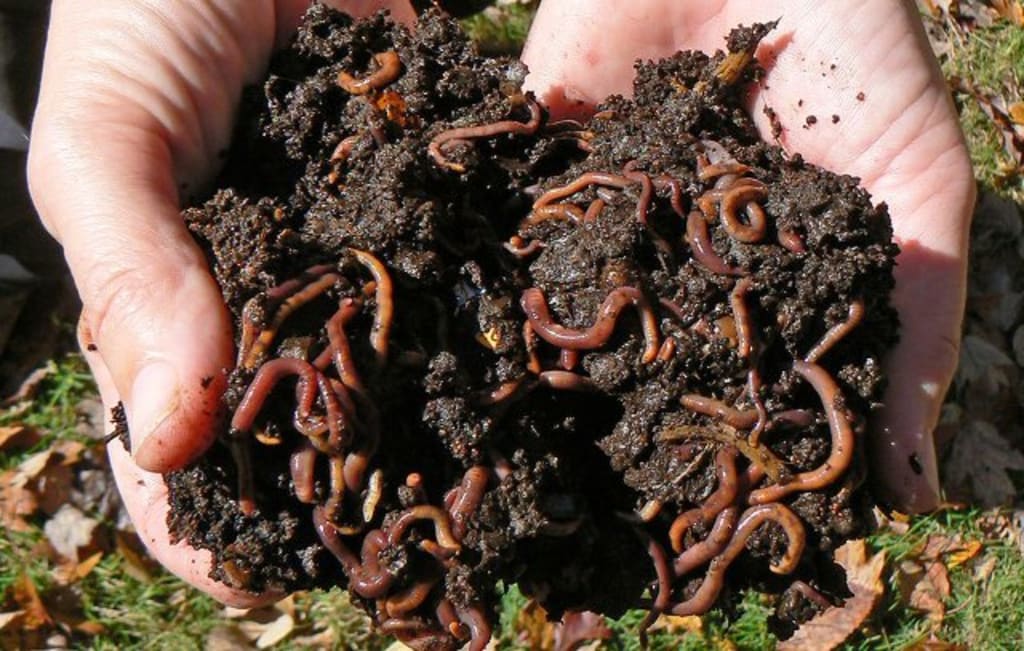A Healthy Vermicompostor Doesn't Stink
How to keep your worm farm healthy!

I love my worm farm. That's probably weird, but I do love my worms. So making sure they are healthy is my number 1 priority. I have them on the back porch, up on a table to keep them away from the dogs, and any raccoons or opossums that might want to have themselves a wriggly snack.
When you start a worm farm, there's one thing you gotta know. A healthy worm farm doesn't stink. Nor does it have mold. It also shouldn't have mites or other pests - and don't be surprised if frogs and spiders are attracted to your worm farm, regardless if it's indoors or outside. Whether you buy yourself a professional worm farm or make yourself a cheap one out of 5-gallon buckets or totes, taking care of a worm farm is essentially the same.
How to keep a worm farm healthy is pretty simple.
Keep the worm bin temperature between 55 – 80 degrees F (13 – 27 C)
Stabilize their temperature and make sure their environment doesn't become extreme. Keep your worms alive by keeping them somewhere your temperature is relatively stable. Your worms do not like extreme temperatures. Temperatures start becoming deadly for your worms at around 95 degrees F, and 0 degrees. If your worm farm is outdoors, during the winter you will need to give them lots of insulation, or you can move them into a garage or shed.
On cold days, you can insulate their bed using fabric, shredded cardboard, cotton, and shredded newspaper to provide extra insulation if moving them indoors is not an option.
On really hot days, if the temperature starts getting above 95 degrees F, you're going to need to create a cold spot by adding a frozen water bottle to the worm farm. Make sure your worm farm is never in direct sunlight, and never ever EVER add water to them on a really hot day. It could result in boiling them. Worms are delicate creatures, and in unideal temperatures, they are likely to perish if you don't correct it.
A garden thermometer (or any for that matter) is an easy solution to keeping track of your worm's temperatures on very cold or very hot days. If your worms get overheated or too cold, they won't be as productive, and you will see a drastic cessation of decomposition. You will also notice worms doing a mass exit of their enclosure if the conditions are not right. A worm farm will stay about 10 degrees F cooler than the outside air in the heat, and 10 degrees F warmer in the winter.
A balanced Ph balance of between 6.0 and 7.0 is perfect for worms.
It's relatively easy to keep the PH balance and the acidity low for worms. You simply avoid putting acidic things in there. Do not put meat in your bin, or cat or dog feces. Don't put oranges, onions, peppers, lemons, limes, or anything else acidic. They love cardboard and newspaper for nesting in.
A good device to measure both PH and temperature, sunlight exposure, and all kinds of stuff is this all-in-one soil tester. If you use it in your garden, it's really handy, but it's great for worms. It's affordable, and you can keep track of the two most important things in one swoop.
Make sure there is no mold or pest bugs in the soil.
Different outbreaks mean different problems in regards to PH and temperature. You can find information easily on why your worm farm is developing mites, maggots, and mold online. Never ever put salt in your worm farm by the way, or pesticides. There is always a natural solution to get rid of pest bugs in your worm farm, it just takes time and patience.
Remember that worms can eat a lot, and reproduce fast. So if you get overpopulated, you may want to consider selling your worms to fishermen, or other people starting worm farms. You can even expand your worm farm by creating another worm colony.
Make sure your worm bin and the castings inside are not too wet, and not too dry.
The castings should always be moist. They should not be soggy or soaking wet, but you absolutely should be able to squeeze a few drops of liquid from a handful of castings easily. If your worm farm is too wet, make sure to drain it. A worm farm that you bought should have a spout, make sure you collect your worm liquid regularly. If it's soggy, you should shred cardboard and paper, and layer it in thin layers on the top of the bedding, and let it soak up the moisture. Once it's completely soaked, put another layer over the top and let it soak up the water again.
On hot days when your worm farm needs moisture, make sure you wait until nightfall, or put your worm farm in the shade. You need to let the soil in the bin cool before you add water, or you might boil your worms. Since compost retains head, make sure you shake it up or stir it as needed to help the soil cool down faster.
And that is all you need to know about keeping a worm farm happy and healthy. These are the most important points, as they all will result in whether your worms survive or die. Once you get the balance and temperature correct and stabilized all year round, then you have hardly any kind of maintenance other than harvesting your castings every so often and feeding them.
If you would like to learn more about worm farms, check out the following articles.
Where to sell your worm poop and for how much?
Learn about the benefits of worm/composting!
Disclaimer: My links are affiliate links, I may earn a commission if you decide to click on the links and buy them from Amazon. Thank you for your support!






Comments
There are no comments for this story
Be the first to respond and start the conversation.